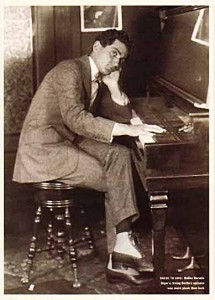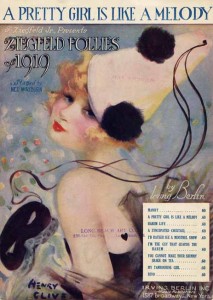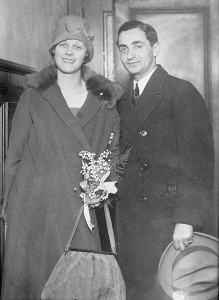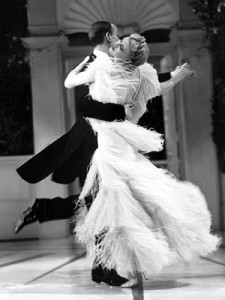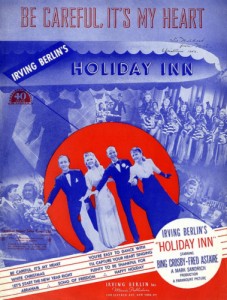Irving Berlin was a master at saying "I Love You" in 32 bars. He was so good at it that Cole Porter dubbed an entire genre of 20th century love songs, the “Berlin ballad." Like Cole, Berlin wrote both words and music.
As early as 1911 Irving Berlin was a hit maker, writing Tin Pan Alley classics and Broadway novelty show tunes like "O How I Hate to Get Up in the Morning."
It took him awhile, but once he began to compose lyrical love songs Berlin couldn’t be stopped. His runaway success in 1919, "A Pretty Girl is Like a Melody," was adopted as the theme song of the Ziegfield Follies and marked a turning point in his career. In the late 20s his "Blue Skies" became a hit of the first popular talking picture, The Jazz Singer starring Al Jolson. Then a decade later in 1935 Berlin’s "Cheek to Cheek" from Top Hat won the Academy Award.
The love story of Irving Berlin and Ellin MacKay was juicy tabloid fare. She was a socially prominent heiress—tall, blonde and Catholic. He was a short, shy, immigrant Jewish guy—from the wrong side of the tracks.
Never mind that he was talented and famous; when they secretly got married at City Hall, her father disinherited her. Their elopement stirred up quite a media frenzy. Even songwriters got in the game. One ditty was called "A Kid from the East Side Found a Sweet Society Rose." But Ellin and Irving thumbed their noses at them all and "lived happily ever after" for 62 years.
Irving Berlin never liked to admit it, but his love for Ellin made a change in his music. When Ellin’s father first got wind of their affection for each other, she was shipped off to Europe—out of his reach. It was during this year of separation that Berlin began to compose some of his most memorable romantic songs, including "Remember" and "Always." Berlin wrote them as sentimental waltzes in 3/4 time, but Jim and The Band swing them on our show today in 4/4.
Irving Berlin wrote many of his most enduring works for motion pictures. In the 1930s Fred Astaire and Ginger Rogers ushered in an era of elegance and romance with satin gowns, white tie and tails, and Irving Berlin wrote hit tunes for them including his 1935 Academy Award winner, Cheek to Cheek. Riding the Hollywood musical bandwagon, the following year Berlin took on a commission from RKO to write songs for the musical comedy, Follow The Fleet—another Fred and Ginger film that produced the song "I’m Puttin’ All My Eggs in One Basket." On our radio Valentine Nina Ferro steps in to sing it with Jim Cullum and the Band.
In 1940, while under contract to Paramount Pictures, Berlin had an idea for a movie musical about an inn that opened only on public holidays. The result was 1942's Holiday Inn. Berlin wrote twelve songs expressly for the film, each one about a holiday. The film's blockbuster hit was "White Christmas," but "Be Careful, It's My Heart," written for the Valentines' Day segment, also did well. In the film sequence Bing Crosby croons this song while Fred Astaire steals his girlfriend behind his back. Astaire is at his most graceful and charming, whirling his new sweetheart—played by Marjorie Reynolds— around the dance floor, then leaping with her through a gigantic paper heart at the end.
Irving Berlin had an almost mystical bond with America’s popular taste. Over six decades he spun out songs marked by patriotism, optimism and sentimentality. Swingable and full of harmonic surprises, his songs have been popular with generations of jazz musicians. And, he showed a wide range of styles and genres—we can only marvel that the same composer could write songs as diverse as "Cheek to Cheek," "White Christmas" and the bluesy "Suppertime."
It’s said that Berlin never threw anything away he’d ever composed. If an idea for a tune or a melodic fragment—or sometimes an entire tune—was not used, he'd put it away with an eye toward some future use in his 'composer's trunk.' Some time in the late 20s Berlin delved into his trunk and pulled out a scrap of paper. Two lines captured his imagination—"How Deep is the Ocean? How High is the Sky?" Nina Ferro joins The Jim Cullum Jazz Band to offer her smoky rendition of Berlin's famous torch song on our Irving Berlin Valentine.
Vocalists on Riverwalk Jazz this week are frequent visitors to our stage at The Landing. Nina Ferro hails from Australia and currently lives and works in London. Topsy Chapman is from
New Orleans and appeared in the international hit musical One Mo' Time, created by Vernel Bagneris. Rebecca Kilgore is based in Portland, Oregon and frequently appears on NPR's Fresh Air with Terry Gross.
Photo credit for Home Page: "Cheek to Cheek" sheet music, 1935. Image courtesy songbook1.wordpress.
Text based on Riverwalk Jazz script by Margaret Moos Pick ©2010


